- Home
- Dirk Patton
Indestructible: V Plague Book 7 Page 4
Indestructible: V Plague Book 7 Read online
Page 4
I was surprised by his offer of help, unsure if it was sincere or a tactic to get me to relax.
“What about your sacred ground?” I asked. “How do we get around that?”
“That’s all bullshit,” he answered. “Well, not to most of my tribe, but I don’t believe in that shit. It’s just something the old men and women use to try and hold on to the past and control the younger generations.”
“Then why the hell were you giving me such a hard time?” I asked.
“Look at me and what do you see?” He asked, the anger clear in his voice.
“An asshole,” I answered, drawing a snort from him.
“No, you see a redskin savage. A lazy, out of work drunk with nothing that hasn’t been handed to him by the white man.” His voice was getting louder as he talked. Apparently there was some pretty deep-seated resentment there.
“You’re wasting my time,” I said. “I don’t give a fuck if your red, black or purple. And I sure don’t give a shit what you think the white man has done to you. When you’re ancestors were being herded onto reservations, mine were literally starving to death in Ireland and selling their souls to get on ships to America so their children would have a chance at survival. None of our people had it easy.”
I expected more arguing. More accusations of prejudice. Anything other than a genuine, deep laugh as he slowly stood up, rifle held out to his side in one hand to make sure I didn’t open fire.
“Let’s go find your wife, white man. I’ll tell you a story to pass the time while we run.” He said.
After a moment I got to my feet, finally lowering my rifle but keeping both hands on it. This guy was either certifiable or playing some really weird game. I didn’t know which, maybe a little of both, but I wasn’t ready to start trusting him.
“After you,” I said, gesturing at the river. I wasn’t about to let him behind me again.
He grinned, turned and led the way into the water.
8
The current in the river was slow. No more than a mile an hour at best. And the water was warm; unlike the frigid dunking I’d taken in the Mississippi when I jumped in after Rachel and Dog. The footing was easy, feeling like packed sand with an occasional rock. As we approached the middle, the water rose above my waist and stayed there until I was within ten feet of the far side. It was an easy crossing and neither of us had any trouble keeping our rifles high and dry.
On the opposite bank I called a halt long enough to draw my pistol and make sure no water was trapped anywhere inside. Weapon ready, I motioned to my new traveling companion and he set off at a fast trot. I fell in slightly behind and to his side.
The tracks out of the water were clear in the damp earth, then we moved back onto the prairie grass and were easily following the trail their passage had created. The Indian’s legs were longer than mine and he settled into a steady, ground eating lope that I had to concentrate to keep up with. I reminded myself of our different heritages; his one of running to hunt and survive, mine one of hard physical labor on small plots of land. I still kept up with him.
Half an hour after we left the river he started talking. He asked my name, which I told him. He asked what my story was, which I didn’t. My silence didn’t deter him, and now that I’d broken through he couldn’t seem to shut up.
His name was Joseph Revard. It wasn’t an Osage name, which he assured me would be unpronounceable to my tongue. Revard was French, a legacy of the trading alliance that was formed in the 1600s between the Osage nation and French traders. He talked for miles about the history of his people, not sugar coating any of the injustices perpetrated by the US Government, both real and perceived. Many of them I’d heard before, growing up, some of them I hadn’t. None of them were something that should ever have happened, but there’s no changing the past.
Then he began talking about himself and I was so surprised I began to fall behind and had to run hard to close the distance that opened up between us. Joe had left the reservation when he was 19 to go live amongst the white man. He had encountered open and hostile prejudice, and the subtle kind where people were overly polite and solicitous. He said he preferred the ones that were open with their racism because at least he knew exactly where he stood with them.
When he was 20 he was washing dishes in a greasy spoon truck stop, ready to give up on dreams of making it in the white mans’ world. That was when he met Mary. She was young, pretty and as white and blonde as a tourism poster for Oklahoma. Mary was a waitress in the truck stop and the moment they met he could feel something different about her. When she looked at him, she looked into his eyes and saw the man he was. He wasn’t even sure she realized he was an Indian.
Mary was a student at Oklahoma State, and when she wasn’t waiting tables at the truck stop she was in class or the library. Totally enamored with the beautiful girl, Joseph began hanging around the campus to steal a moment with her between classes or when she would take a break from studying. She was always happy to see him and he quickly fell completely and hopelessly in love.
There was a small contingent of Osage students at OSU and it didn’t take them long to discover and befriend Joe. With their support, and Mary’s encouragement, he enrolled in the University. He had no goal, no idea what he would do with an education, but knew if he was going to be part of Mary’s life he couldn’t continue to be an uneducated dish washer.
Federal programs paid for Joe’s tuition and books, and by the end of his first semester he and Mary were sharing a small apartment within walking distance of the campus. They studied hard, worked hard and made time for each other whenever they could. By the end of his freshman year, Joe had discovered that he had an interest in and an affinity for the biological sciences.
Three years later he graduated with an honors degree in bio-chemistry, walking across the stage hand in hand with Mary, his new bride. After graduation came graduate school for both. Mary studied literature, but Joseph began working on a degree in virology. He had completed his Masters and was awaiting word on whether or not he had been accepted into the Doctoral program when the attacks happened.
Life had remained relatively normal in Oklahoma for the first few weeks, then secondary outbreaks began occurring. Joe was spending twenty hours a day in the lab, working with senior researchers who were looking for any way to battle the Chinese engineered virus. Then the Air Force had shown up with a data stick and vials of a liquid that they claimed were a vaccine.
The team had worked around the clock to verify that they did in fact have a viable vaccine in hand. Exhausted, yet excited, Joe had rushed home to share the wonderful news with Mary and had almost been killed when he walked in the front door. Mary had been in the back of the apartment when he opened the door, screaming and charging. Joe had barely gotten the door closed before she slammed into it in her efforts to rip his throat out.
While he had been working, she had turned. The screaming devil that had attacked when he opened the door wasn’t his wife any more. But he couldn’t bring himself to leave her. For a whole day he sat on the porch as Mary prowled their small home, occasionally screaming her frustration and anger.
Joe was still sitting there when his friend, Robert, found him. Robert was also an Osage and a fellow graduate student at OSU. He was on his way to the reservation, fleeing the city, and had stopped to check on Joe and Mary. He had sat down and held his friend, crying with him for his loss. Wrung out, Joe had stood and asked Robert if he could borrow the old Colt pistol he was wearing.
Weapon in hand, Joe had slowly approached the door. With a deep breath he had turned the knob and shoved the door open, pistol raised and pointed into his home. Mary charged. Joe hesitated, unable or unwilling to defend himself. Only Robert’s warning shout saved him, snapping him out of whatever reverie he was in and making him pull the trigger and kill his wife.
Handing the gun back to Robert, he’d walked past his friend and climbed into his pickup. Robert had gotten in a moment later and started dri
ving them out of the city, but Joe redirected him to the University’s Health Science Center where he’d been working. Going in by himself, he’d taken an empty backpack. By this time production of the vaccine had begun and he filled the pack with as many vials as it would hold.
Bringing the pack, he and Robert had returned to the reservation and immediately begun administering the vaccine. Joe had been gone a long time and had forgotten the mistrust of white man medicine that was prevalent amongst the tribe. Less than a third of the Osage were willing to be vaccinated. He did what he could, then begged the tribal elders to help him convince those that had refused to be inoculated. They turned him down, and he’d gone to his family home in despair.
Over the next several days the Osage that hadn’t received the vaccine began to turn, and kill anyone around them. Soon the infected outnumbered the living and Joe and Robert barely escaped with their lives. They ran to the open plains, battling females that had tracked them until they were almost out of ammo. The day before I encountered Joe, Robert had been killed by a female. Joe had shot her with his last bullet, then buried his friend.
“Where are we going? How far?” I asked when Joe finally finished his story.
“It’s a little over a day’s run from here,” he answered. “Canyon country. The Potawatomi tribe slaughtered hundreds of Osage women and children hiding there in the 1800s. There was a treaty in place and the American government was supposed to provide protection. They didn’t.”
I didn’t feel like debating two hundred year old events with him. I had little doubt that the problems of any of the Indian tribes were at the bottom of the priority list for the Army at the time. Not that I wasn’t sympathetic, but I had more pressing problems to worry about. Besides, I was feeling dizzy again and was having a hard time focusing on Joe’s running form.
9
Colonel Crawford leaned back in the base commander’s office chair and rubbed his eyes. He was tired. Bone weary tired. But the ranks of infected at Tinker Air Force Base’s perimeter fence were growing by the hour as more and more of the civilian population succumbed to the infection, and he didn’t have time to rest. The high altitude EMP intended to disable the satellite the Russians were using to control the herds had knocked out the electrical grid on the base and he was now working in an office lit by the pale green glow of several chemical sticks.
While this was inconvenient for him, it was downright dangerous for the Rangers, Marines and Airmen defending the fence. They had no light. Few of their night vision goggles and scopes were still working as they’d had most of them turned on when the pulse happened. Any electronic device that had been in operation at the time of the nuclear detonation had been permanently destroyed.
The only good news was that there had been very few vehicles and aircraft in operation at the time, so they were still able to use trucks and Humvees as well as put helicopters in the air to support the battle that was raging.
“They’re landing at Fort Hood, sir.” Captain Blanchard said from the shadows on the far side of the office where he had been softly speaking on one of a handful of radios that had survived.
“What does it look like down there?” Crawford asked without bothering to open his eyes.
“All quiet at the moment. Runways are clear and they’re not seeing anything moving on post. But there’s some bad news.”
“Do tell, Captain.” The Colonel said with a note of sarcasm.
“They passed over a herd north of Dallas that they estimate to be at least eight miles long and over two wide. If they’re bunched up as tightly as we’ve seen elsewhere, that’s estimated to be close to twenty-five million infected. Still headed straight for us.” Blanchard said.
Crawford opened his eyes and stared at him, rubbing his temples in a vain attempt to ward off the headache that was threatening to explode into a migraine. He’d sent two squads of Marines and three C-130s to Fort Hood in Texas to raid the armory. They needed ammunition. Desperately. Recon flights throughout the day after the EMP had found other herds still bearing down on Oklahoma City, but none of them were as large as the one that had just been reported.
“What’s the word from the Navy? Did the EMP do the job, or not?” Crawford asked.
“They’re still trying to figure that out, sir. We lost everything that was over North America except for two NSA birds. The Navy never had access to them in the first place, and since the NSA doesn’t exist anymore they’re having to try and hack their way in.”
“If they can’t get in, how do they know they’re functioning?” The Colonel asked, shoving papers around the desktop until he found a pack of cigarettes.
“They’re showing as active nodes on the Echelon network which they wouldn’t if the EMP had disabled them. But being NSA assets, they’re encrypted very heavily and it’s not a simple job to break in and take control. We don’t even know what they’re for or what their capabilities are. Hopefully once the Navy cracks them we’ll have eyes over CONUS as well as orbital intel again.” Blanchard raised the radio to his ear as he finished speaking.
Watching his aide listen to the muted voice, Crawford lit a cigarette and leaned his forearms on the heavy, walnut desk. The desk belonged to Air Force General Triplett, but the man was currently under house arrest in the base commander’s quarters with his wife. A full platoon of Rangers were making sure that he didn’t leave, didn’t have any visitors and wasn’t able to communicate with anyone.
Their arrest of the General for siding with the traitorous US President had started out benign enough the previous evening, but had turned ugly in a hurry. Twenty Air Force Security Forces had been guarding the General. Colonel Crawford had personally led a platoon of Rangers to arrest him and seize control of the strategically vital Air Force base.
The Rangers had moved into position, undetected. Two snipers had set up to cover each end of the large home, both of them also having a clear view of most of the Security Forces. Crawford’s plan had been to move his men forward and capture the Air Force personnel, the advantage of speed and stealth on his side. Once the guards were neutralized it would be a simple matter to affect the General’s arrest.
But things rarely go according to plan. As the Rangers were moving into position, close to the residence of the base’s Deputy Commander, gunfire erupted from one of the second story windows. Unable to sleep, the Air Force Colonel had seen the Army moving into position and rather than sounding an alarm he had grabbed a rifle and started shooting at the two Rangers that were visible from his bedroom window.
“Weapons free for defense!” Crawford had reluctantly shouted into his radio.
He had wanted to do this without shedding any American blood. His heart sank when he heard the suppressed return fire of his men, which quickly silenced the Air Force Colonel. He was sick to his stomach when the Security Forces opened up with their Humvee mounted machine gun. Three Rangers died before the snipers took out the gunner, and they had to kill five more of the General’s guards before the rest of the men put their weapons on the ground and surrendered.
Crawford had rushed forward, a squad on his heels, intending to kick in the General’s front door. Murder and mayhem were in his eyes as he approached the front porch, the squad snapping their weapons up as the heavy wooden door swung open. It was the General’s wife, wearing a thick robe over her nightgown. She moved to block the opening with her body and stood facing Crawford.
The Colonel stood on the first step, the General’s wife staring him down. They remained that way for a few moments, neither moving nor speaking. Finally the woman had stepped back into her home and waved Crawford inside. Leaving the Rangers on the porch he had stepped cautiously through the door, which she left standing open and pointed down a hall. Crawford had removed his beret and walked quietly in the indicated direction.
At the end of the hall had been a heavy oak door, stained dark and highly polished to match the décor of the home. Pistol in hand, Crawford had opened the door and stepped into
General Triplett’s den. The General was seated in one of a pair of high backed, leather wing chairs. He was wearing pajamas and a dressing gown, smoking a cigar and swirling a tumbler of amber liquid. Another glass and a cut crystal decanter of the same drink sat on a silver tray that rested on a table that separated the two chairs.
“Good evening, Colonel. Drink?” He held up the glass, his tone belying the gravity of the moment.
Colonel Crawford holstered his weapon and moved slowly into the room, taking a seat. Triplett held up the decanter and when Crawford nodded he poured a healthy slug into the waiting glass. The Colonel picked it up, his eyes never leaving the superior officer.
“To the United States of America,” The General leaned forward and held his glass out towards the Colonel. Crawford picked up his drink, clinked it against the other man’s glass and they drank together.
“You know why I’m here, sir.” Crawford said, placing his glass back on the silver tray with most of the bourbon still in it.
“How many dead outside?” Triplett asked as if Crawford hadn’t spoken.
“I’m not sure. Several of mine and several of yours. One is too many. This didn’t need to happen this way.”
“I’m not the one in the room committing treason, Colonel.” The General’s eyes flashed.
“No, sir. You’re not, and neither am I. The only person guilty of that is President Clark. I admire and respect your conviction to your oath, but the office that you swore to defend has been corrupted. That only leaves our oath to defend the Constitution, and I’m truly sorry you don’t see it that way.” Crawford’s words were respectful, but his voice was like cold iron.
The General sat quietly, puffing on a cigar that he finally placed in a gleaming crystal ashtray. Downing the remainder of his drink he gently set it next to Crawford’s glass.

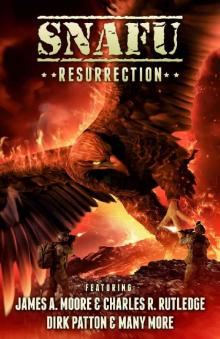 SNAFU: Resurrection
SNAFU: Resurrection The Awakening
The Awakening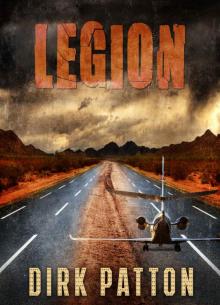 Legion: V Plague Book 19
Legion: V Plague Book 19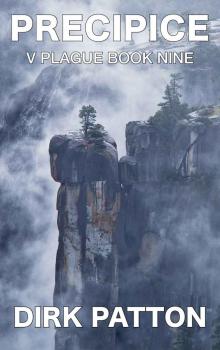 Precipice: V Plague Book 9
Precipice: V Plague Book 9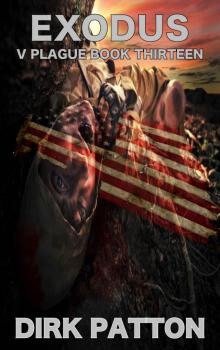 V Plague (Book 13): Exodus
V Plague (Book 13): Exodus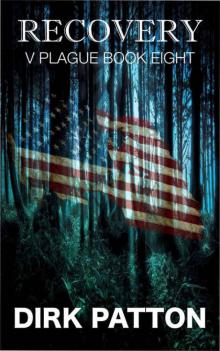 Recovery: V Plague Book 8
Recovery: V Plague Book 8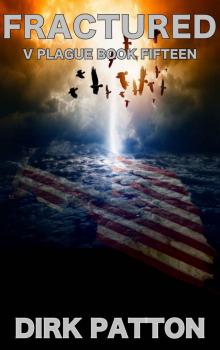 Fractured: V Plague Book 15
Fractured: V Plague Book 15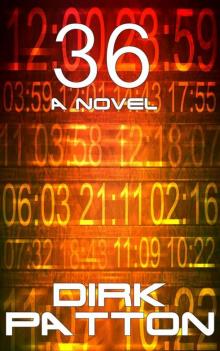 36: A Novel
36: A Novel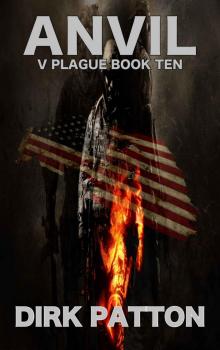 Anvil
Anvil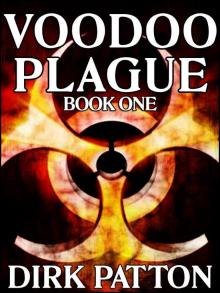 Voodoo Plague - 01
Voodoo Plague - 01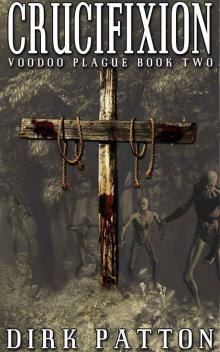 Crucifixion - 02
Crucifixion - 02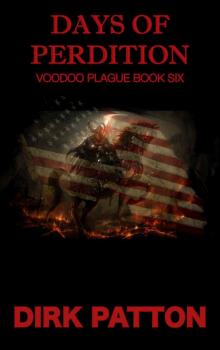 Days Of Perdition: Voodoo Plague Book 6
Days Of Perdition: Voodoo Plague Book 6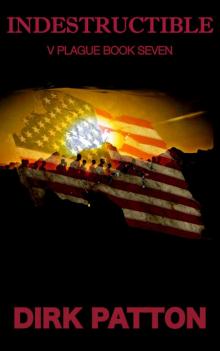 Indestructible: V Plague Book 7
Indestructible: V Plague Book 7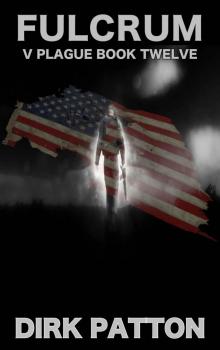 Fulcrum: V Plague Book 12
Fulcrum: V Plague Book 12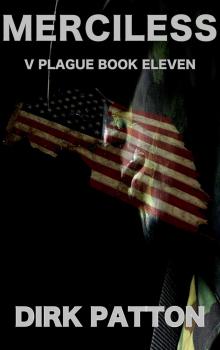 V Plague (Book 11): Merciless
V Plague (Book 11): Merciless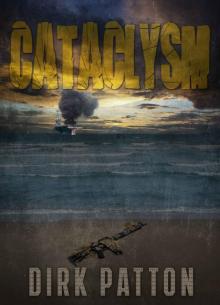 Cataclysm: V Plague Book 18
Cataclysm: V Plague Book 18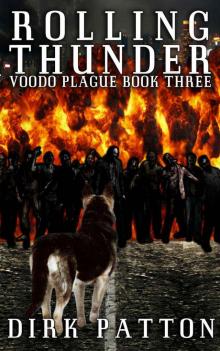 Rolling Thunder - 03
Rolling Thunder - 03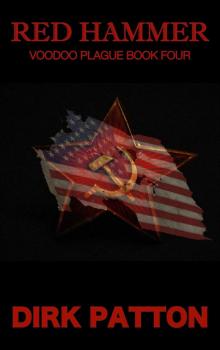 Red Hammer: Voodoo Plague Book 4
Red Hammer: Voodoo Plague Book 4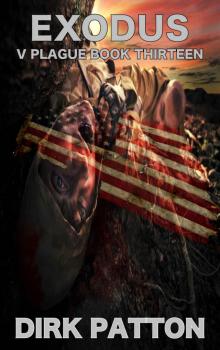 Exodus: V Plague Book 13
Exodus: V Plague Book 13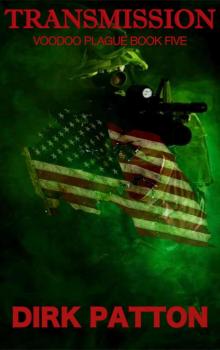 Transmission: Voodoo Plague Book 5
Transmission: Voodoo Plague Book 5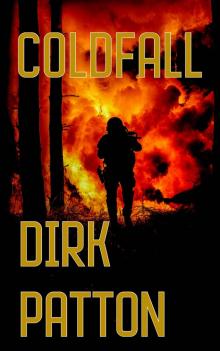 Coldfall
Coldfall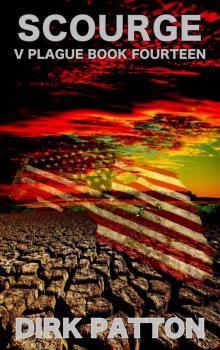 Scourge: V Plague Book 14
Scourge: V Plague Book 14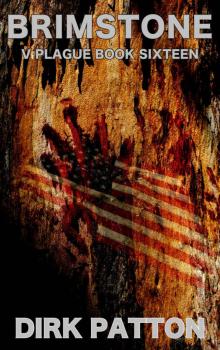 V Plague (Book 16): Brimstone
V Plague (Book 16): Brimstone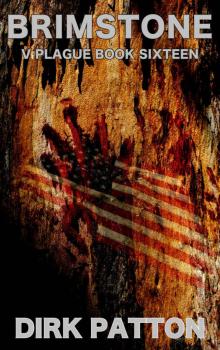 Brimstone: V Plague Book 16
Brimstone: V Plague Book 16